
BIRD-CRITIC-1
[NeurIPS 2025 Main] SWE-SQL: Illuminating LLM Pathways to Solve User SQL Issues in Real-World Applications
Stars: 769
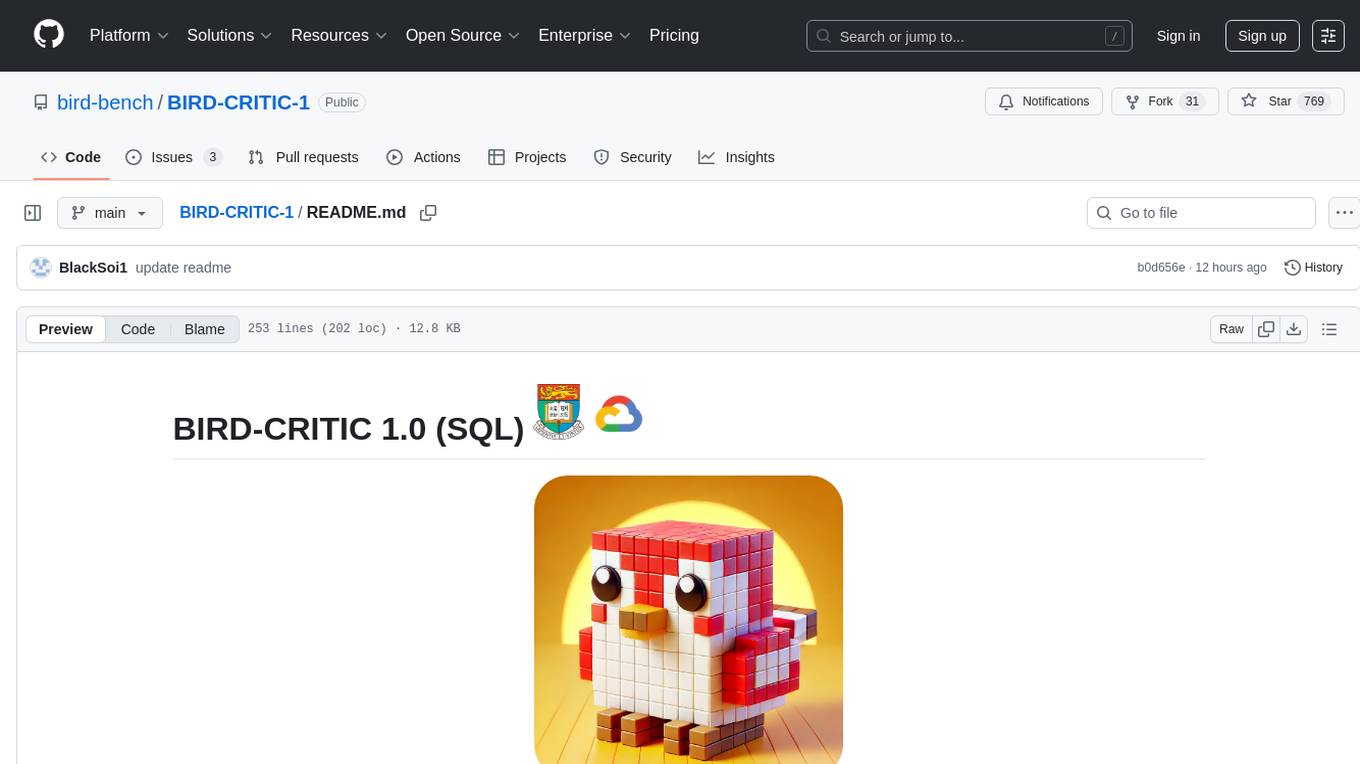
BIRD-CRITIC 1.0 is a SQL benchmark designed to evaluate the capability of large language models (LLMs) in diagnosing and solving user issues within real-world database environments. It comprises 600 tasks for development and 200 held-out out-of-distribution tests across 4 prominent open-source SQL dialects. The benchmark expands beyond simple SELECT queries to cover a wider range of SQL operations, reflecting actual application scenarios. An optimized execution-based evaluation environment is included for rigorous and efficient validation.
README:
- 📢 [2025-07-09] We release the human performance scores on our website! The scores displayed across all three leaderboards reflect human evaluators (database experts) who were allowed to use standard tools (database textbooks, official documentation, or IDEs) but not AI assistants. When another group with the same expertise was permitted to use AI tools (ChatGPT, Claude, or Gemini), the performance increased to 83.33 on Open, 87.90 on PG, and 90.00 on Flash, demonstrating the significant potential of human-AI collaboration in SQL problem-solving.
- 📢 [2025-06-28] We release our paper SWE-SQL (a.k.a BIRD-CRITIC) on arxiv.
- 📢 [2025-06-09] We release bird-interact-lite, feature multi-turn conversational and agentic interaction for real-world ambiguous and challenging text-to-SQL tasks.
- 📢 [2025-06-08] We release bird-critic-1.0-postgresql, a single-dialect SQL issue debugging set with 530 complex tasks.
- 📢 [2025-05-30] We are pleased to release LiveSQLBench-Base-Lite, featuring 18 end-user level databases and 270 tasks (180 SELECT-only, 90 Management tasks). Each task involves unambiguous and straightforward user queries grounded in external knowledge, with medium to hard complexity SQL statements.
BIRD-Critic 1.0 introduces a novel SQL benchmark designed to evaluate a key capability: Can large language models (LLMs) diagnose and solve user issues within real-world database environments?
The benchmark comprises 600 tasks for development and 200 held-out out-of-distribution (OOD) tests. BIRD-CRITIC 1.0 is built on realistic user issues across 4 prominent open-source SQL dialects: MySQL, PostgreSQL, SQL Server, and Oracle. It expands beyond simple SELECT queries to cover a wider range of SQL operations, reflecting actual application scenarios. Finally, an optimized execution-based evaluation environment is included for rigorous and efficient validation.
Each task in BIRD-CRITIC has been verified by human experts on the following dimensions:
- Reproduction of errors on the BIRD environment to prevent data leakage.
- Carefully curated test case functions for each task specifically.
- Soft EX: This metric can evaluate SELECT-ONLY tasks.
- Soft EX + Parsing: This metric can evaluate tasks with user-specific requirements or refinements.
- Test Case: For DBA tasks, such as CRUD (CREATE, READ, UPDATE, DELETE), test cases are designed to evaluate the correctness of the logic. This is also effective for user issues requiring multiple sequential SQL queries to resolve.
- Query Execution Plan: For user tasks involving efficiency improvement or runtime errors, QEP (Query Execution Plan) can be used to evaluate solution SQL queries at the algorithm level.
- Fast Eval Sandbox via PostgreSQL template & docker.
- Created new RDBs in different scales and professional domains.
We are releasing a lite version of BIRD-Critic, bird-critic-1.0-flash-exp, which includes 200 high-quality user issues on PostgreSQL when developing real-world applications. We curate tasks by:
- Collecting and understanding realistic user issues.
- Distilling problem definitions and SQL knowledge.
- Reproducing bugs and solutions in the BIRD environment.
- Designing test cases for evaluation.
The open version of BIRD-CRITIC 1.0, bird-critic-1.0-open, is a comprehensive benchmark that includes 570 tasks across 4 SQL dialects: MySQL, PostgreSQL, SQL Server, and Oracle. It covers a wide range of SQL operations and user issues.
| Rank | Model Name | Score | Level |
|---|---|---|---|
| 1 | o3-mini-2025-01-31 | 34.50 | 🏆 Leading |
| 2 | deepseek-reasoner (r1) | 33.67 | 🌟 Elite |
| 3 | o1-preview-2024-09-12 | 33.33 | 🌟 Elite |
| 4 | claude-3-7-sonnet-20250219(thinking) | 30.67 | 🌟 Elite |
| 5 | gemini-2.0-flash-thinking-exp-01-21 | 30.17 | 🌟 Elite |
| 6 | grok-3-beta | 29.83 | 💎 Superior |
Complete results of Open version can be found here. Bird-CRITIC 1.0 Flash result can be found here
bird-critic-1.0-pg, is a dataset containing 530 high-quality user issues focused on real-world PostgreSQL database applications.
Key Findings:
- Agentic workflows significantly improve LLM performance on debugging tasks through iterative environment interaction
- SQLACT consistently outperforms ToolACT across all models, demonstrating the advantage of SQL's richer action space for handling complex debugging scenarios
The BIRD-CRITIC 1.0 benchmark is available in the following configurations:
-
bird-critic-1.0-flash-exp: A lite version consisting of 200 instances on PostgreSQL. -
bird-critic-1.0-open: The full version containing 570 instances across MySQL, PostgreSQL, SQL Server, and Oracle. -
bird-critic-1.0-postgresql: A 530-instance version specifically for PostgreSQL. -
bird-critic-1.0-bigquery: A lite version containing between 100 and 200 instances for BigQuery.
- Database: The complete database can be download from the Google Drive. Check the Quick Eval section for more details.
-
data: Each data instance contain the following main parts:
-
db_id: The name of the database. -
query: The user query is rewritten in the BIRD environment. -
issue_sql: The buggy SQL query written by the user. -
sol_sql: The ground truth SQL solution. -
preprocess_sql: SQL queries to run before executing the solution or prediction. -
clean_up_sql: SQL queries to run after the test cases to revert any changes made to the database. -
test_cases: A set of test cases to validate the predicted corrected SQL. -
efficiency: True if this question needs optimization, measure the cost by Query Execution Plan (QEP) -
external_data: For the external JSON data if present
-
-
baseline: The baseline code is available in the
./baselinedirectory. -
evaluation: The evaluation code is available in the
./evaluationdirectory. - Curated by: BIRD Team & Google Cloud
- License: cc-by-sa-4.0
- HuggingFace Dataset Card: bird-critic-1.0-flash-exp
To avoid data leakage by auto-crawling, we do not include GT solution sqls and test cases along with data. please email [email protected] or [email protected] for full set, which will be sent automatically.
You can download the dataset from HuggingFace using the following command:
from datasets import load_dataset
# Load the flash version of the dataset
dataset = load_dataset("birdsql/bird-critic-1.0-flash-exp")
print(dataset["flash"][0])
# Load the open version of the dataset
dataset = load_dataset("birdsql/bird-critic-1.0-open")
print(dataset["open"][0])Or you can use the provided script to download the open version of the dataset and split it into different dialects.
cd baseline/data
python pull_data.py \
--schema_path path/to/open_schema.jsonl \
--input_path path/to/input.jsonl \ # Path to the input JSONL file (may be empty if you want to download the dataset from HuggingFace)
--output_folder path/to/output_dir # output folder of the split files.
├── LICENSE
├── README.md
├── baseline
│ ├── data
│ ├── outputs
│ ├── run
│ └── src
├── evaluation
│ ├── docker-compose.yml
│ ├── env
│ ├── mssql_table_dumps
│ ├── mysql_table_dumps
│ ├── oracle_table_dumps
│ ├── postgre_table_dumps
│ ├── run
│ └── src
├── materials
│ ├── ...
└── requirements.txt
To run the baseline code you need to install the following dependencies:
conda create -n bird_critic python=3.10 -y
conda activate bird_critic
pip install -r requirements.txtYou also need to setup the model name (eg., gpt-4o-2024-08-06) with the API key in the config.py file. Then you can run the following command to generate the output:
# Generate the prompt
cd baseline/run
bash generate_prompt.sh
# LLM Inference, need to set the API key in config.py
bash run_baseline.shThe output will be save in the ./baseline/outputs/final_output/
We use docker to provide a consistent environment for running the benchmark. To set up the environment, follow these steps:
- First download the PostgreSQL, MySQL, SQL Server and Oracle database from the Google Drive.
- Unzip the folder and save it in the
./evaluationnamed with postgre_table_dumps,mssql_table_dumps, mysql_table_dumps and oracle_table_dumps. - Build the docker compose
cd evaluation
docker compose up --build- Interact with the database
You can use the
perform_query_on_{dialect}_databases()function in theevaluation/src/{dialect}_utils.pyfile to interact with the each database. The function will return the result of the query. - Run the evaluation script inside the so_eval_env container
docker compose exec so_eval_env bash
cd run
bash run_eval.sh You have to specify the dialect you want to evaluate in the run_eval.sh script. The options are:
postgresqlmysqlsqlserver-
oracleThe output report file will be saved in the same folder as your input file. If you want the log file for each instance, you can set the--loggingtotruein therun_eval.shscript.
If you find our work helpful, please cite as:
@article{li2025swe,
title={SWE-SQL: Illuminating LLM Pathways to Solve User SQL Issues in Real-World Applications},
author={Li, Jinyang and Li, Xiaolong and Qu, Ge and Jacobsson, Per and Qin, Bowen and Hui, Binyuan and Si, Shuzheng and Huo, Nan and Xu, Xiaohan and Zhang, Yue and others},
journal={arXiv preprint arXiv:2506.18951},
year={2025}
}
- [x] Release lite version, bird-critic-1.0-flash (200).
- [x] Open source code, leaderboard page.
- [x] Release Full bird-critic-1.0-open (570 w/ 4 dialects).
- [x] Release Full bird-critic-1.0-postgresql (530 pg tasks).
- [ ] Release SIX-GYM (Sql-fIX), with 2000+ gym-like training environment.
- [ ] Release trained agentic baseline BIRD-Fixer.
- [ ] Update Agentic (SQL-Act) Baseline.
BIRD Team & Google Cloud
For Tasks:
Click tags to check more tools for each tasksFor Jobs:
Alternative AI tools for BIRD-CRITIC-1
Similar Open Source Tools

BIRD-CRITIC-1
BIRD-CRITIC 1.0 is a SQL benchmark designed to evaluate the capability of large language models (LLMs) in diagnosing and solving user issues within real-world database environments. It comprises 600 tasks for development and 200 held-out out-of-distribution tests across 4 prominent open-source SQL dialects. The benchmark expands beyond simple SELECT queries to cover a wider range of SQL operations, reflecting actual application scenarios. An optimized execution-based evaluation environment is included for rigorous and efficient validation.
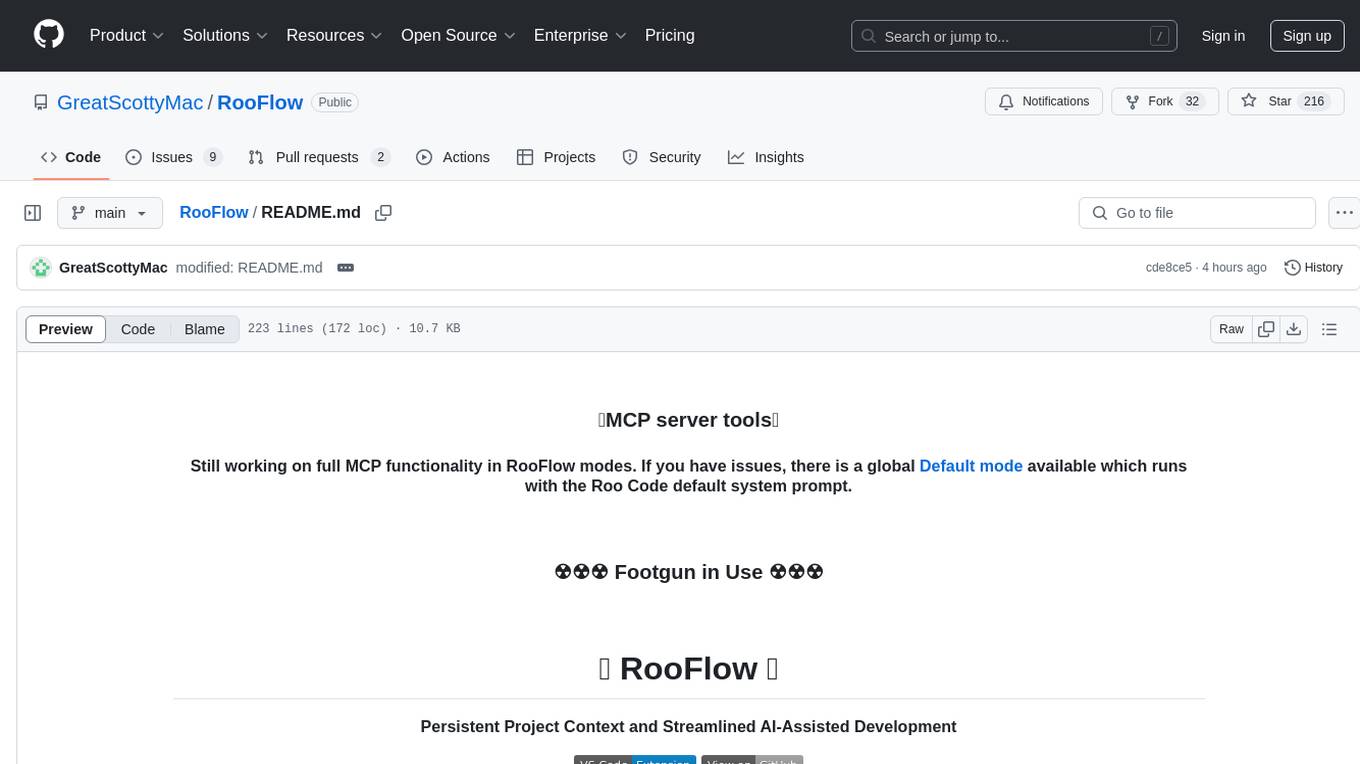
RooFlow
RooFlow is a VS Code extension that enhances AI-assisted development by providing persistent project context and optimized mode interactions. It reduces token consumption and streamlines workflow by integrating Architect, Code, Test, Debug, and Ask modes. The tool simplifies setup, offers real-time updates, and provides clearer instructions through YAML-based rule files. It includes components like Memory Bank, System Prompts, VS Code Integration, and Real-time Updates. Users can install RooFlow by downloading specific files, placing them in the project structure, and running an insert-variables script. They can then start a chat, select a mode, interact with Roo, and use the 'Update Memory Bank' command for synchronization. The Memory Bank structure includes files for active context, decision log, product context, progress tracking, and system patterns. RooFlow features persistent context, real-time updates, mode collaboration, and reduced token consumption.
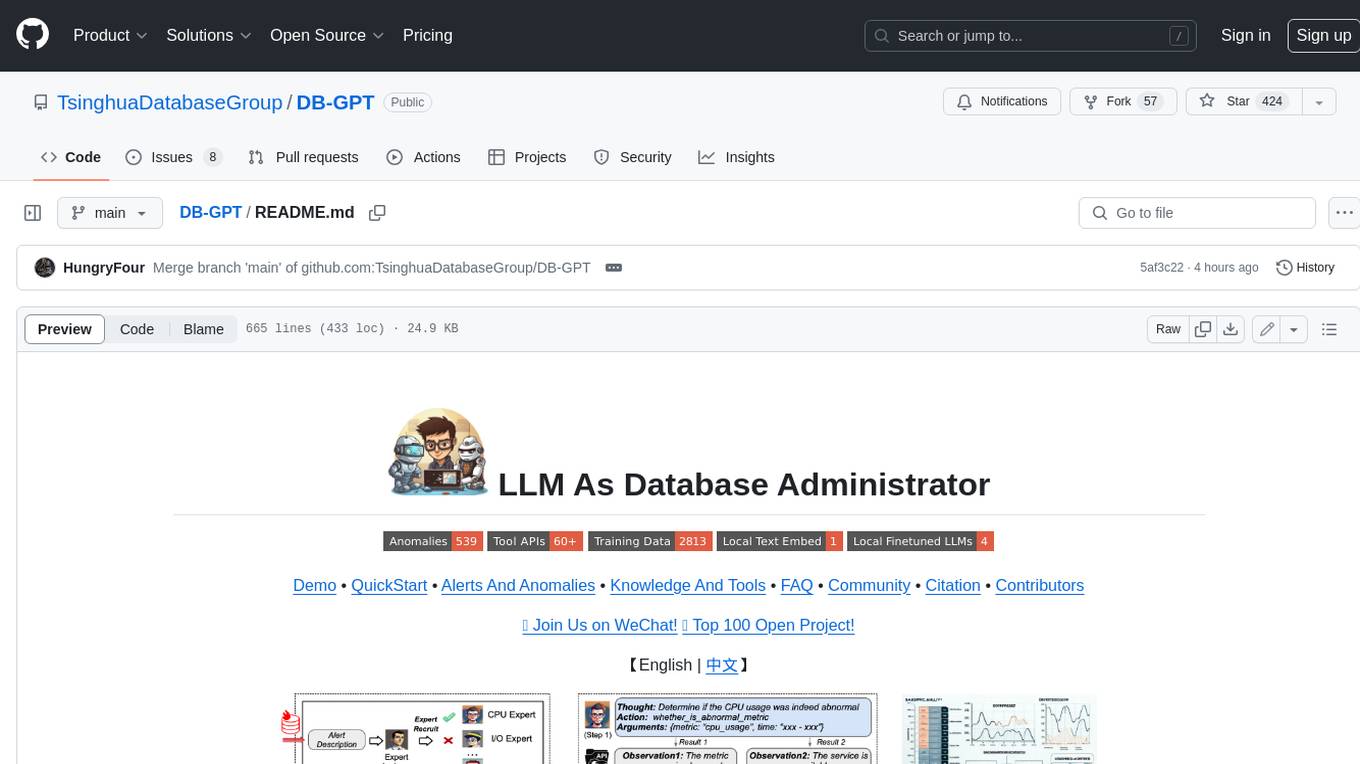
DB-GPT
DB-GPT is a personal database administrator that can solve database problems by reading documents, using various tools, and writing analysis reports. It is currently undergoing an upgrade. **Features:** * **Online Demo:** * Import documents into the knowledge base * Utilize the knowledge base for well-founded Q&A and diagnosis analysis of abnormal alarms * Send feedbacks to refine the intermediate diagnosis results * Edit the diagnosis result * Browse all historical diagnosis results, used metrics, and detailed diagnosis processes * **Language Support:** * English (default) * Chinese (add "language: zh" in config.yaml) * **New Frontend:** * Knowledgebase + Chat Q&A + Diagnosis + Report Replay * **Extreme Speed Version for localized llms:** * 4-bit quantized LLM (reducing inference time by 1/3) * vllm for fast inference (qwen) * Tiny LLM * **Multi-path extraction of document knowledge:** * Vector database (ChromaDB) * RESTful Search Engine (Elasticsearch) * **Expert prompt generation using document knowledge** * **Upgrade the LLM-based diagnosis mechanism:** * Task Dispatching -> Concurrent Diagnosis -> Cross Review -> Report Generation * Synchronous Concurrency Mechanism during LLM inference * **Support monitoring and optimization tools in multiple levels:** * Monitoring metrics (Prometheus) * Flame graph in code level * Diagnosis knowledge retrieval (dbmind) * Logical query transformations (Calcite) * Index optimization algorithms (for PostgreSQL) * Physical operator hints (for PostgreSQL) * Backup and Point-in-time Recovery (Pigsty) * **Continuously updated papers and experimental reports** This project is constantly evolving with new features. Don't forget to star ⭐ and watch 👀 to stay up to date.
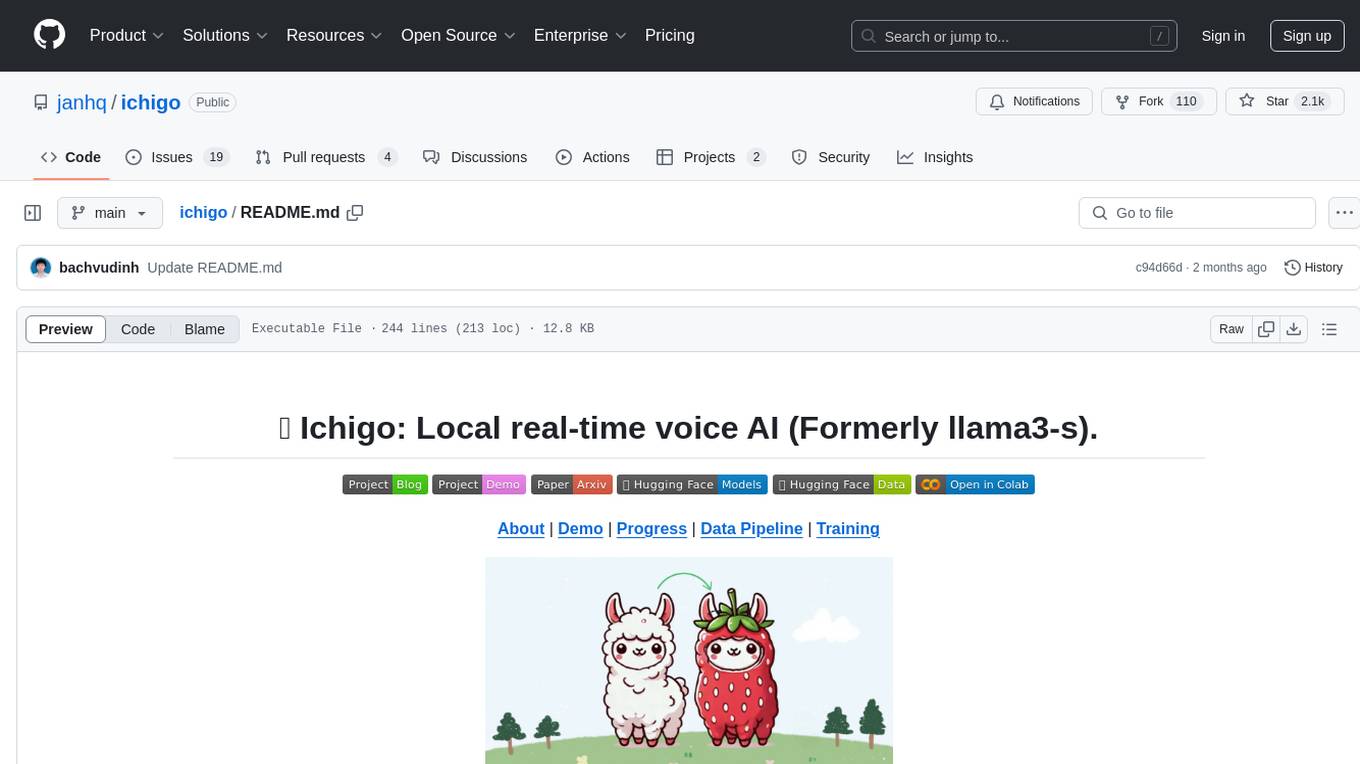
ichigo
Ichigo is a local real-time voice AI tool that uses an early fusion technique to extend a text-based LLM to have native 'listening' ability. It is an open research experiment with improved multiturn capabilities and the ability to refuse processing inaudible queries. The tool is designed for open data, open weight, on-device Siri-like functionality, inspired by Meta's Chameleon paper. Ichigo offers a web UI demo and Gradio web UI for users to interact with the tool. It has achieved enhanced MMLU scores, stronger context handling, advanced noise management, and improved multi-turn capabilities for a robust user experience.
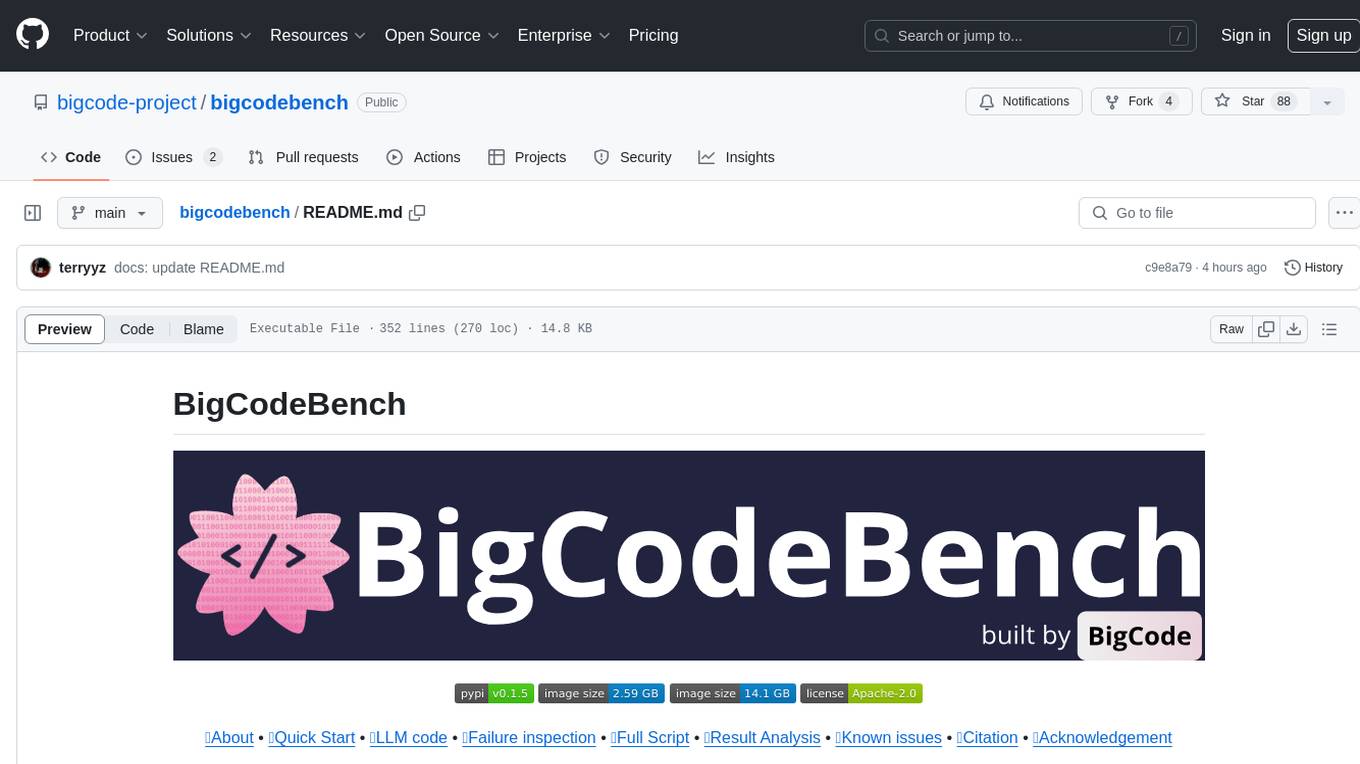
bigcodebench
BigCodeBench is an easy-to-use benchmark for code generation with practical and challenging programming tasks. It aims to evaluate the true programming capabilities of large language models (LLMs) in a more realistic setting. The benchmark is designed for HumanEval-like function-level code generation tasks, but with much more complex instructions and diverse function calls. BigCodeBench focuses on the evaluation of LLM4Code with diverse function calls and complex instructions, providing precise evaluation & ranking and pre-generated samples to accelerate code intelligence research. It inherits the design of the EvalPlus framework but differs in terms of execution environment and test evaluation.
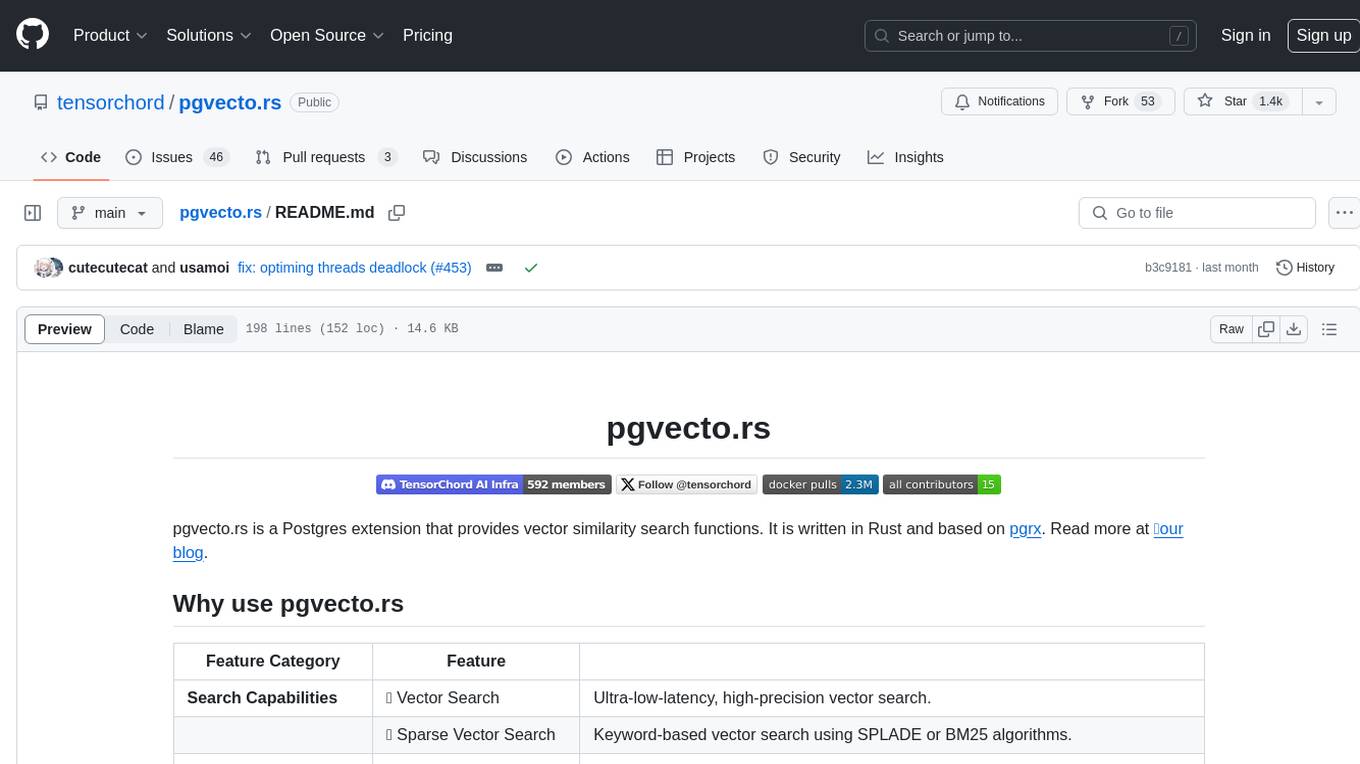
pgvecto.rs
pgvecto.rs is a Postgres extension written in Rust that provides vector similarity search functions. It offers ultra-low-latency, high-precision vector search capabilities, including sparse vector search and full-text search. With complete SQL support, async indexing, and easy data management, it simplifies data handling. The extension supports various data types like FP16/INT8, binary vectors, and Matryoshka embeddings. It ensures system performance with production-ready features, high availability, and resource efficiency. Security and permissions are managed through easy access control. The tool allows users to create tables with vector columns, insert vector data, and calculate distances between vectors using different operators. It also supports half-precision floating-point numbers for better performance and memory usage optimization.
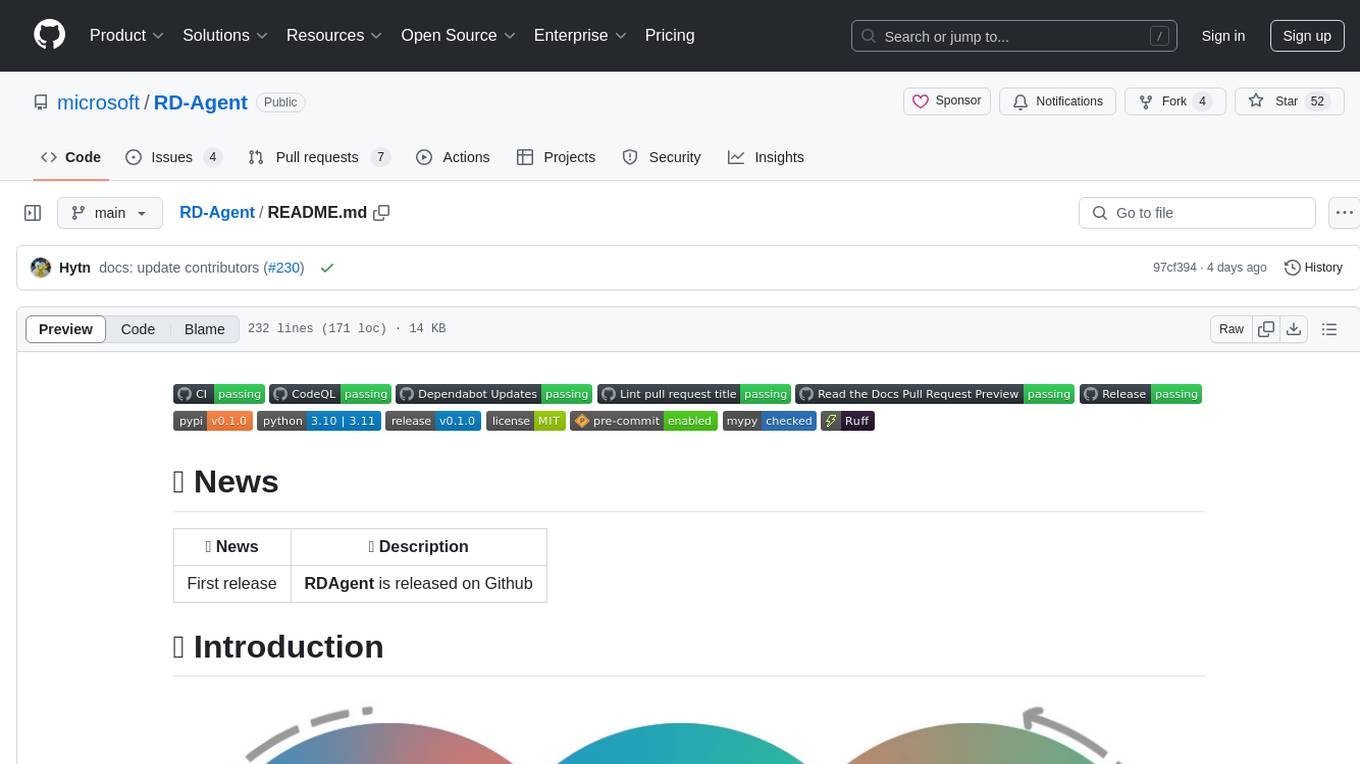
RD-Agent
RD-Agent is a tool designed to automate critical aspects of industrial R&D processes, focusing on data-driven scenarios to streamline model and data development. It aims to propose new ideas ('R') and implement them ('D') automatically, leading to solutions of significant industrial value. The tool supports scenarios like Automated Quantitative Trading, Data Mining Agent, Research Copilot, and more, with a framework to push the boundaries of research in data science. Users can create a Conda environment, install the RDAgent package from PyPI, configure GPT model, and run various applications for tasks like quantitative trading, model evolution, medical prediction, and more. The tool is intended to enhance R&D processes and boost productivity in industrial settings.
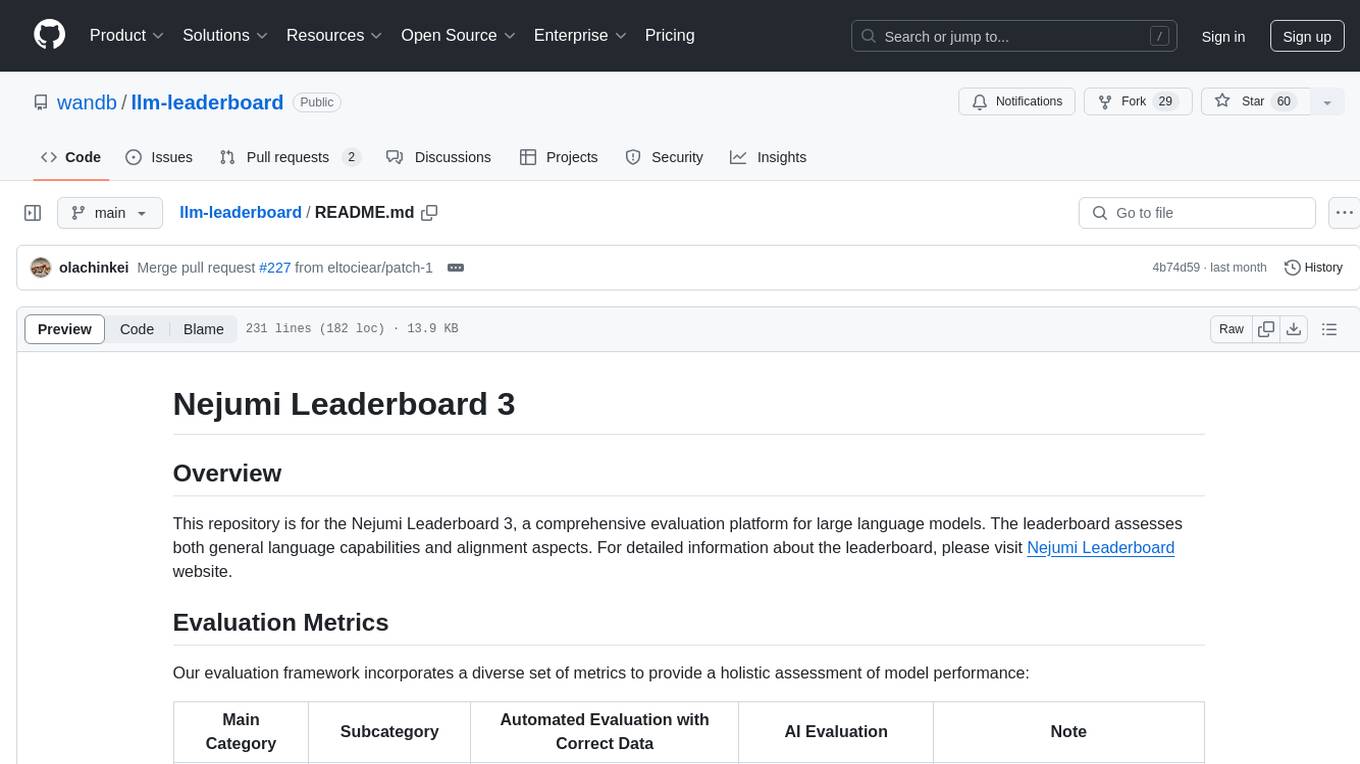
llm-leaderboard
Nejumi Leaderboard 3 is a comprehensive evaluation platform for large language models, assessing general language capabilities and alignment aspects. The evaluation framework includes metrics for language processing, translation, summarization, information extraction, reasoning, mathematical reasoning, entity extraction, knowledge/question answering, English, semantic analysis, syntactic analysis, alignment, ethics/moral, toxicity, bias, truthfulness, and robustness. The repository provides an implementation guide for environment setup, dataset preparation, configuration, model configurations, and chat template creation. Users can run evaluation processes using specified configuration files and log results to the Weights & Biases project.
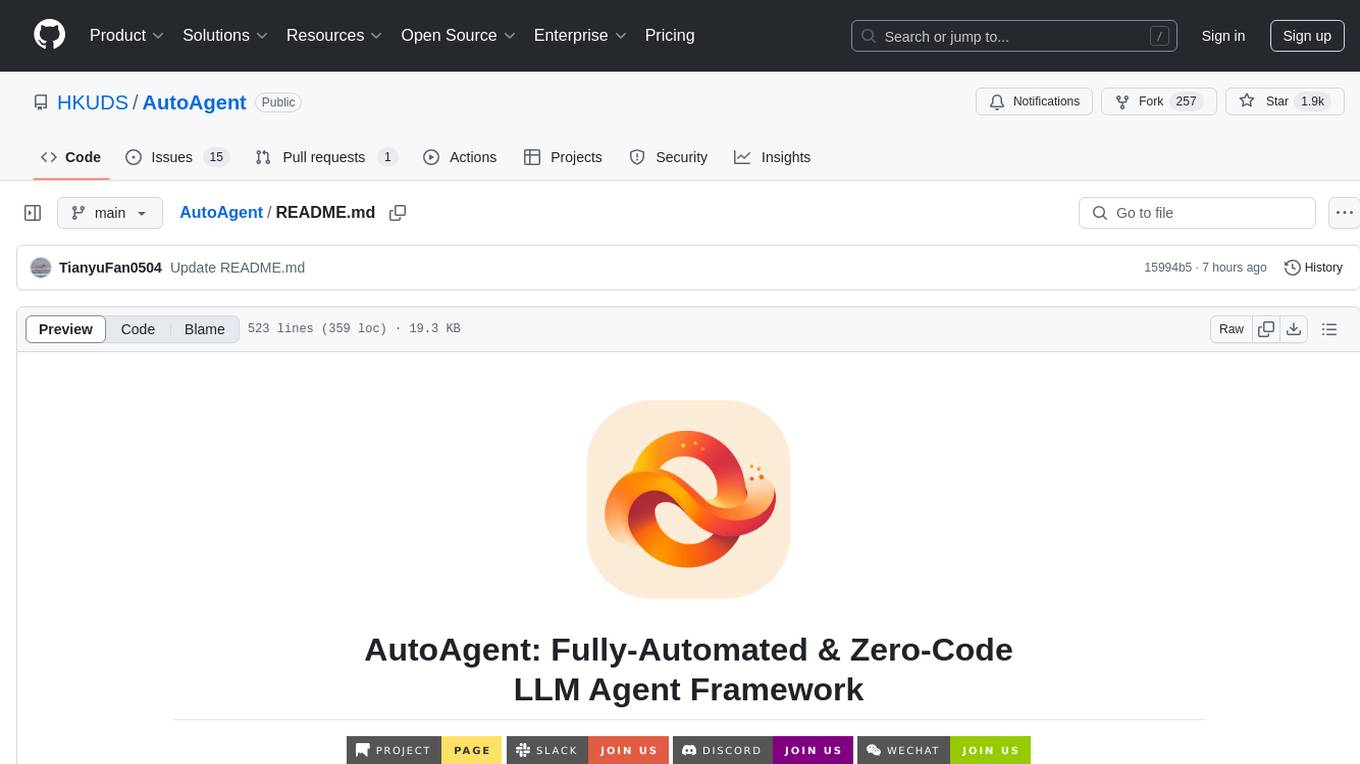
AutoAgent
AutoAgent is a fully-automated and zero-code framework that enables users to create and deploy LLM agents through natural language alone. It is a top performer on the GAIA Benchmark, equipped with a native self-managing vector database, and allows for easy creation of tools, agents, and workflows without any coding. AutoAgent seamlessly integrates with a wide range of LLMs and supports both function-calling and ReAct interaction modes. It is designed to be dynamic, extensible, customized, and lightweight, serving as a personal AI assistant.
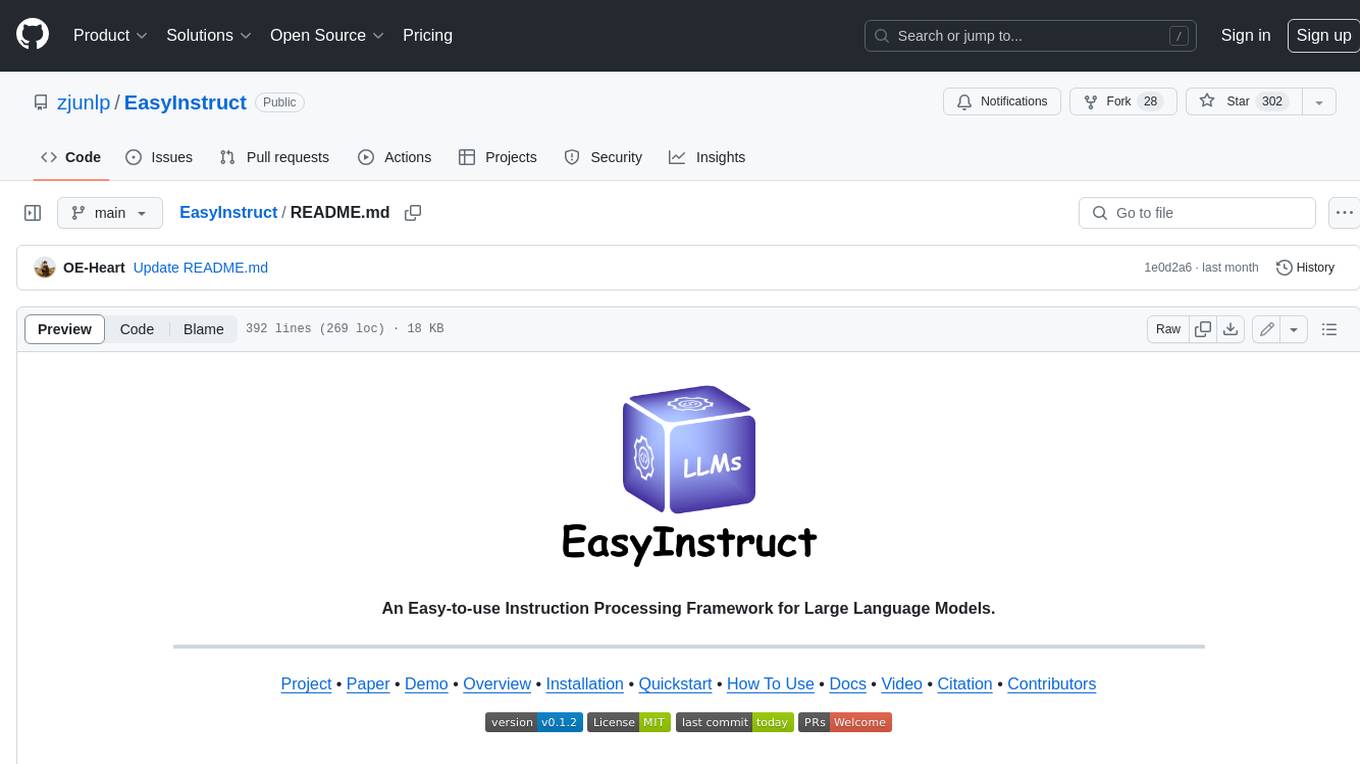
EasyInstruct
EasyInstruct is a Python package proposed as an easy-to-use instruction processing framework for Large Language Models (LLMs) like GPT-4, LLaMA, ChatGLM in your research experiments. EasyInstruct modularizes instruction generation, selection, and prompting, while also considering their combination and interaction.
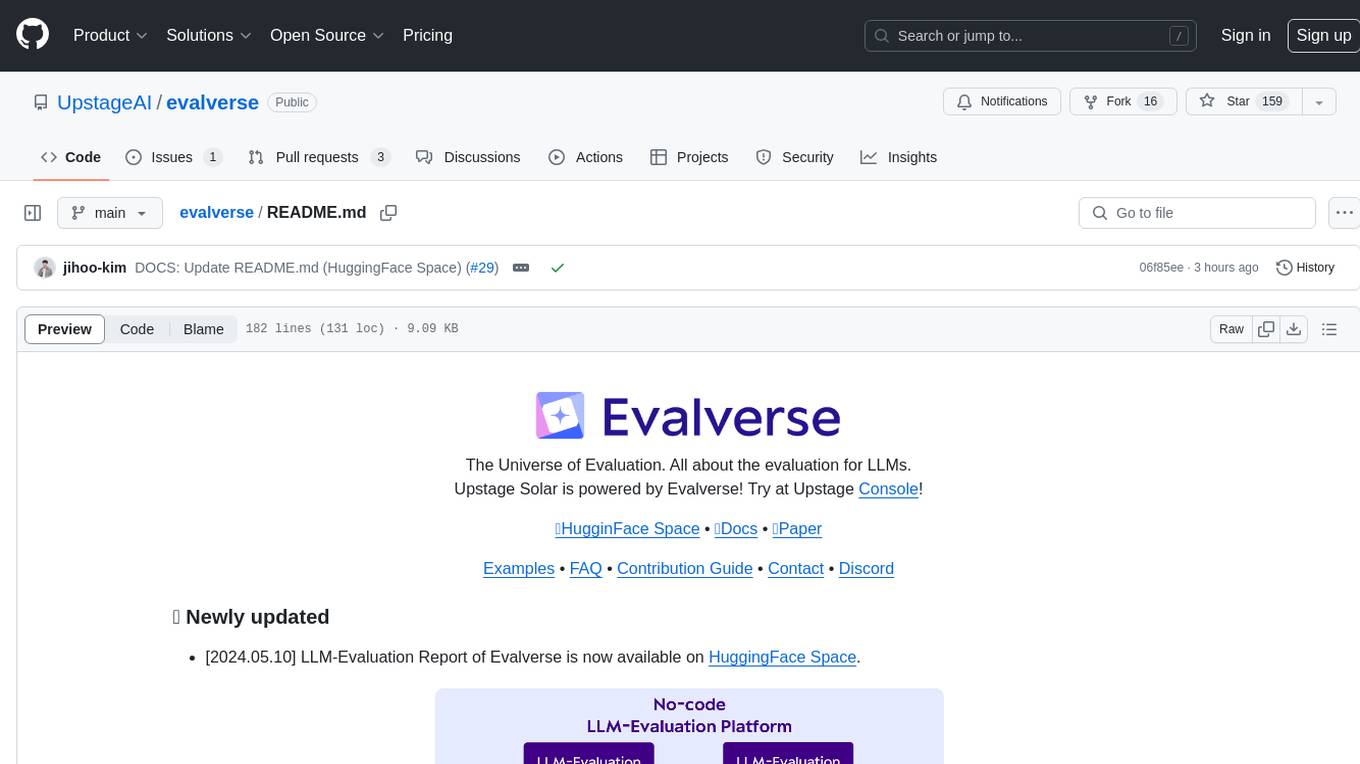
evalverse
Evalverse is an open-source project designed to support Large Language Model (LLM) evaluation needs. It provides a standardized and user-friendly solution for processing and managing LLM evaluations, catering to AI research engineers and scientists. Evalverse supports various evaluation methods, insightful reports, and no-code evaluation processes. Users can access unified evaluation with submodules, request evaluations without code via Slack bot, and obtain comprehensive reports with scores, rankings, and visuals. The tool allows for easy comparison of scores across different models and swift addition of new evaluation tools.
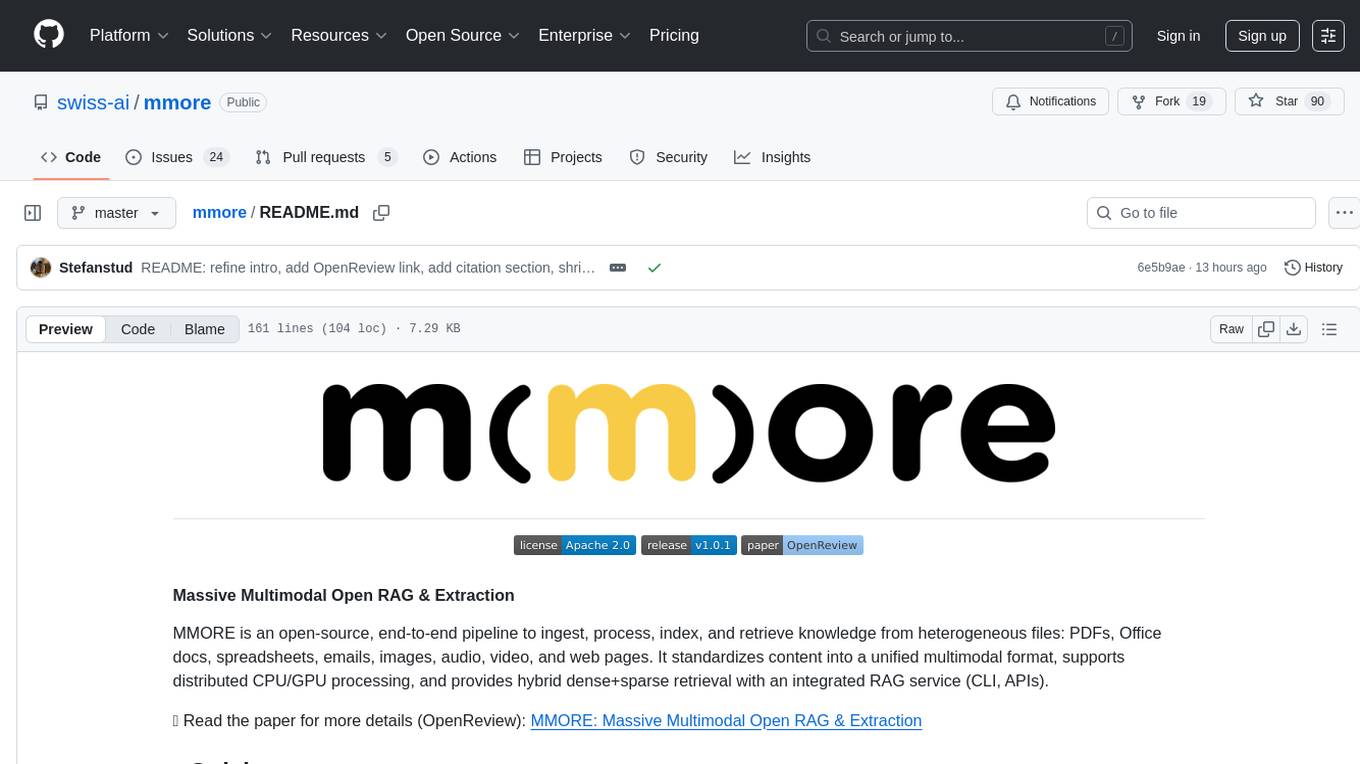
mmore
MMORE is an open-source, end-to-end pipeline for ingesting, processing, indexing, and retrieving knowledge from various file types such as PDFs, Office docs, images, audio, video, and web pages. It standardizes content into a unified multimodal format, supports distributed CPU/GPU processing, and offers hybrid dense+sparse retrieval with an integrated RAG service through CLI and APIs.
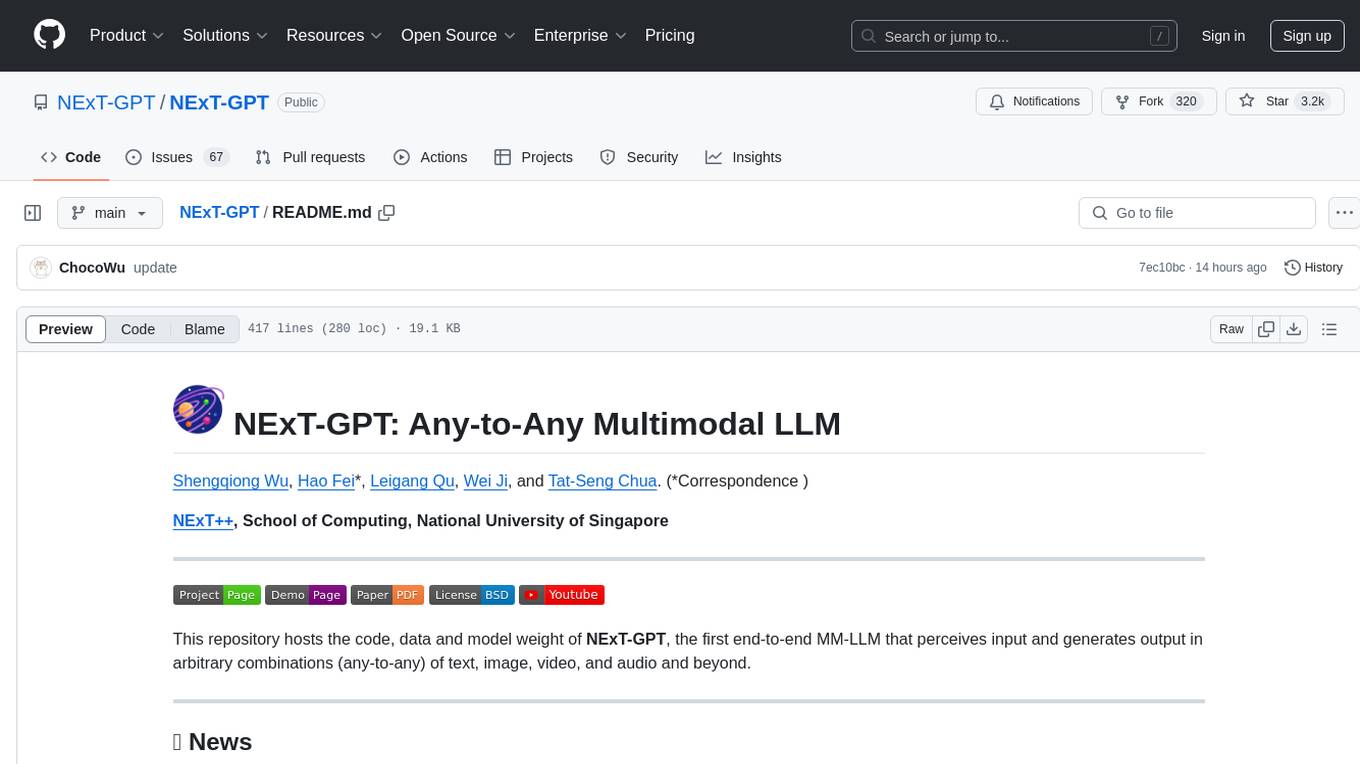
NExT-GPT
NExT-GPT is an end-to-end multimodal large language model that can process input and generate output in various combinations of text, image, video, and audio. It leverages existing pre-trained models and diffusion models with end-to-end instruction tuning. The repository contains code, data, and model weights for NExT-GPT, allowing users to work with different modalities and perform tasks like encoding, understanding, reasoning, and generating multimodal content.
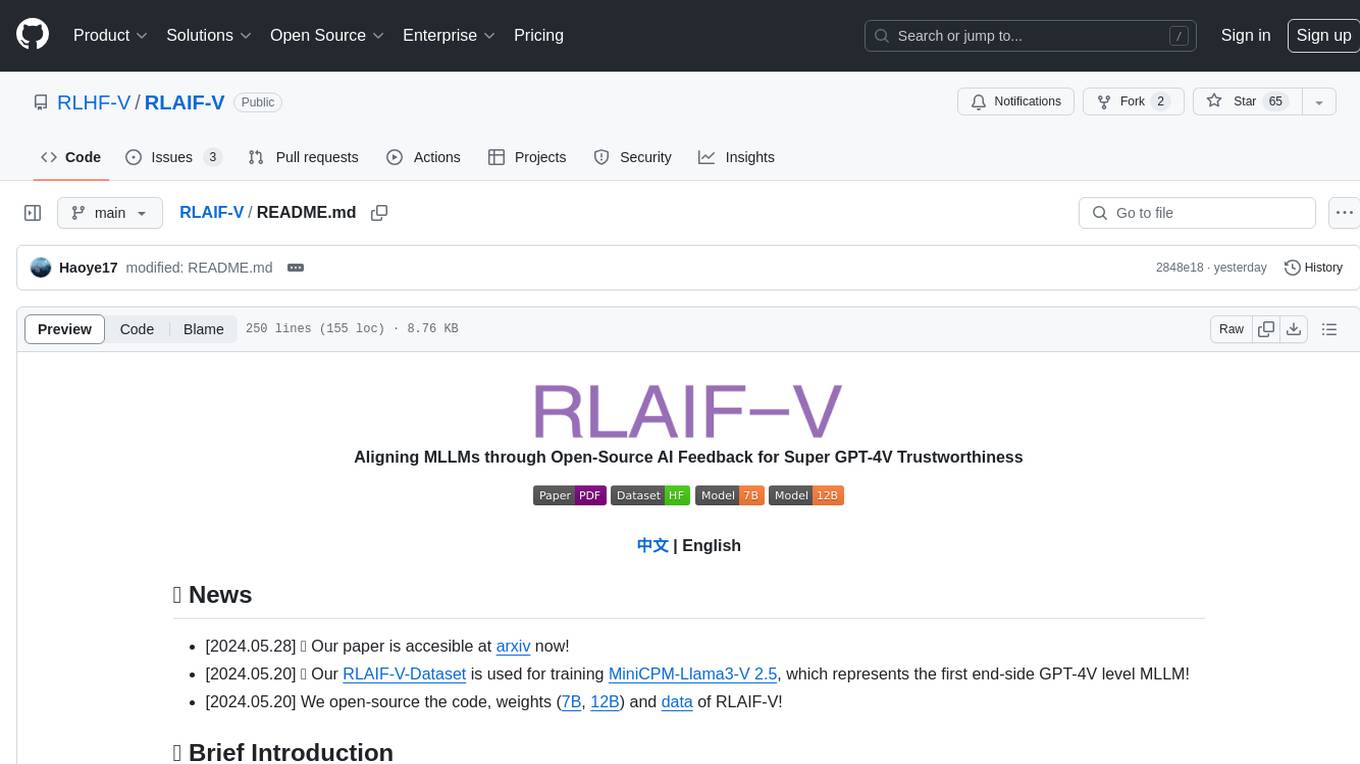
RLAIF-V
RLAIF-V is a novel framework that aligns MLLMs in a fully open-source paradigm for super GPT-4V trustworthiness. It maximally exploits open-source feedback from high-quality feedback data and online feedback learning algorithm. Notable features include achieving super GPT-4V trustworthiness in both generative and discriminative tasks, using high-quality generalizable feedback data to reduce hallucination of different MLLMs, and exhibiting better learning efficiency and higher performance through iterative alignment.
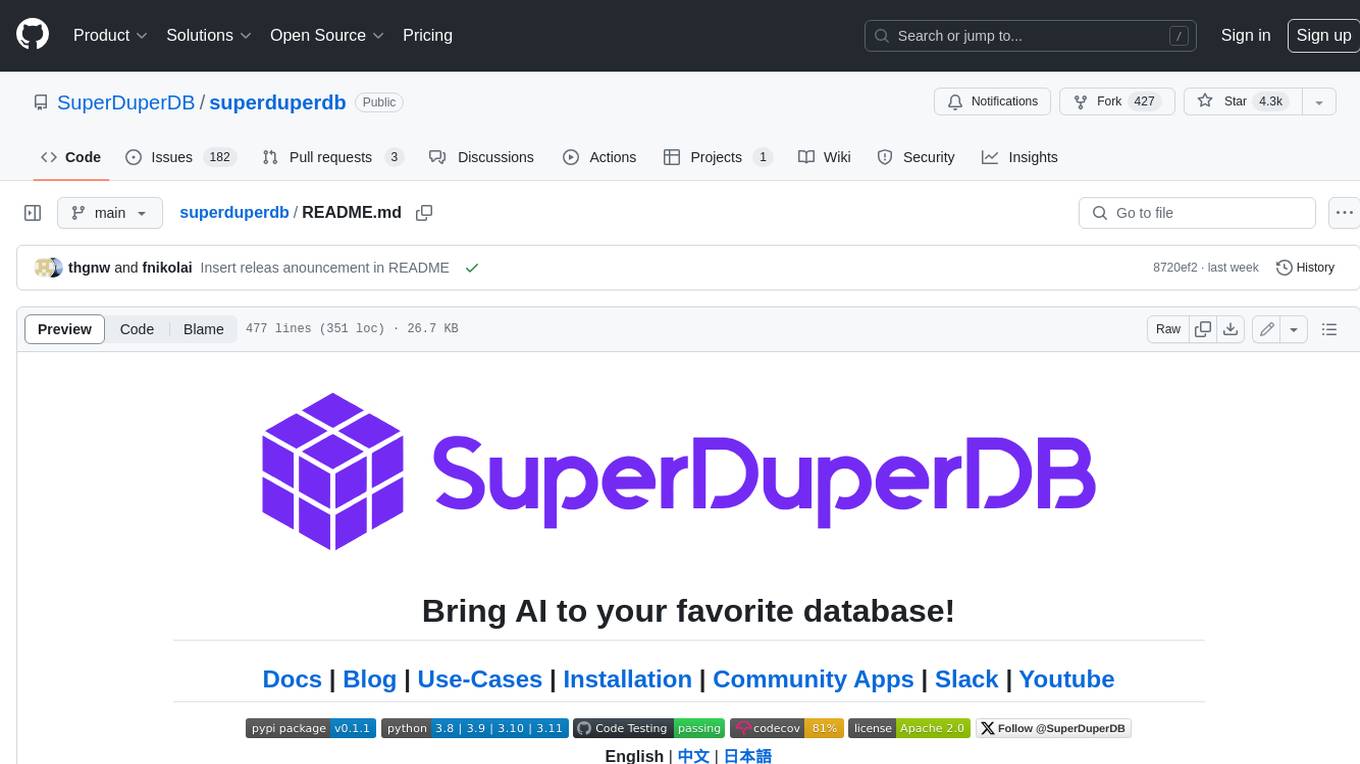
superduperdb
SuperDuperDB is a Python framework for integrating AI models, APIs, and vector search engines directly with your existing databases, including hosting of your own models, streaming inference and scalable model training/fine-tuning. Build, deploy and manage any AI application without the need for complex pipelines, infrastructure as well as specialized vector databases, and moving our data there, by integrating AI at your data's source: - Generative AI, LLMs, RAG, vector search - Standard machine learning use-cases (classification, segmentation, regression, forecasting recommendation etc.) - Custom AI use-cases involving specialized models - Even the most complex applications/workflows in which different models work together SuperDuperDB is **not** a database. Think `db = superduper(db)`: SuperDuperDB transforms your databases into an intelligent platform that allows you to leverage the full AI and Python ecosystem. A single development and deployment environment for all your AI applications in one place, fully scalable and easy to manage.
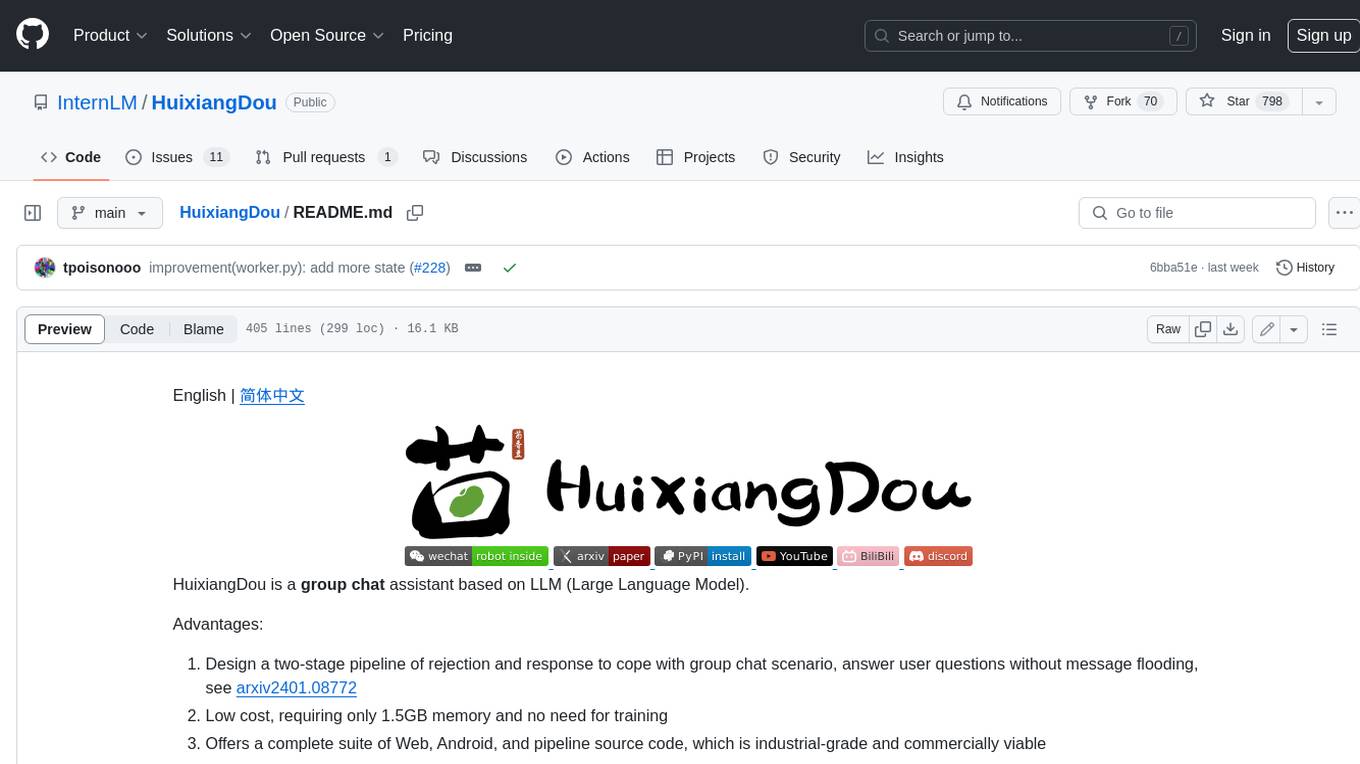
HuixiangDou
HuixiangDou is a **group chat** assistant based on LLM (Large Language Model). Advantages: 1. Design a two-stage pipeline of rejection and response to cope with group chat scenario, answer user questions without message flooding, see arxiv2401.08772 2. Low cost, requiring only 1.5GB memory and no need for training 3. Offers a complete suite of Web, Android, and pipeline source code, which is industrial-grade and commercially viable Check out the scenes in which HuixiangDou are running and join WeChat Group to try AI assistant inside. If this helps you, please give it a star ⭐
For similar tasks

BIRD-CRITIC-1
BIRD-CRITIC 1.0 is a SQL benchmark designed to evaluate the capability of large language models (LLMs) in diagnosing and solving user issues within real-world database environments. It comprises 600 tasks for development and 200 held-out out-of-distribution tests across 4 prominent open-source SQL dialects. The benchmark expands beyond simple SELECT queries to cover a wider range of SQL operations, reflecting actual application scenarios. An optimized execution-based evaluation environment is included for rigorous and efficient validation.
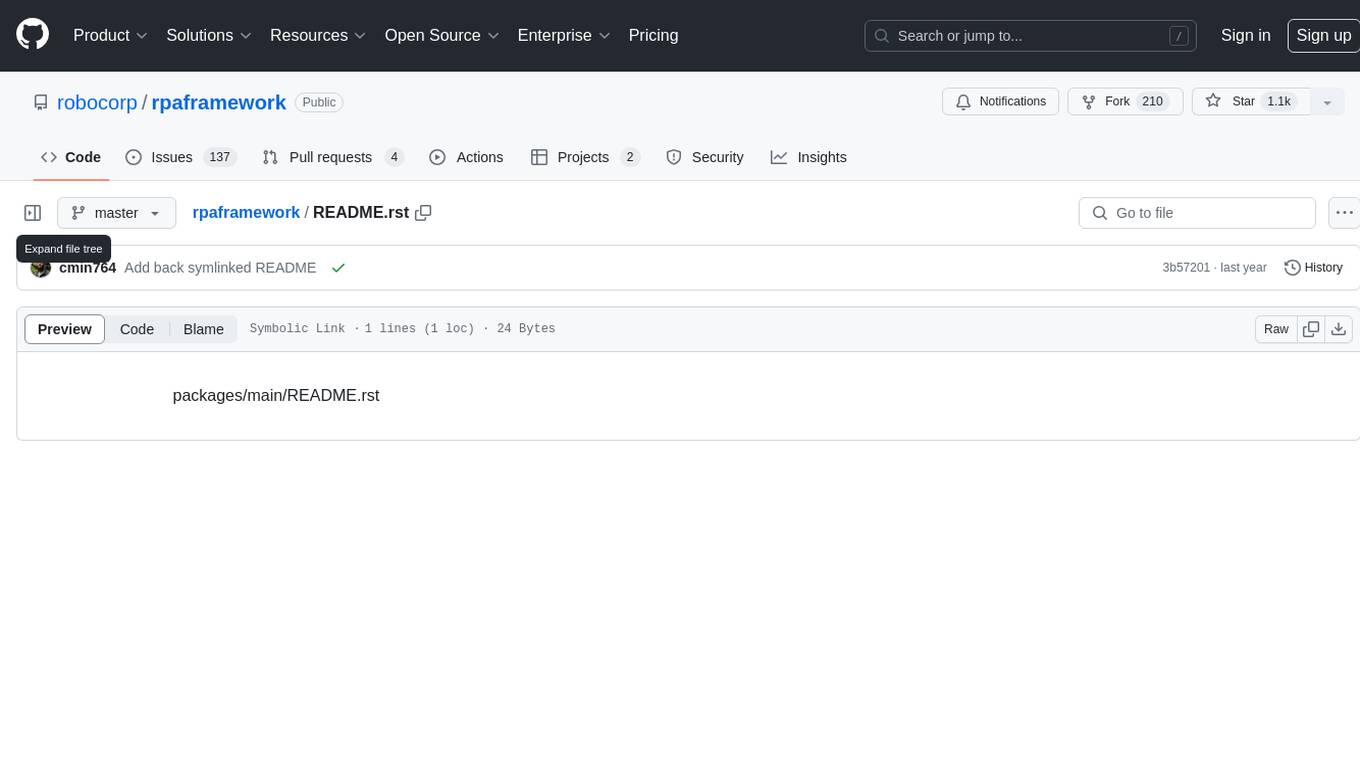
rpaframework
RPA Framework is an open-source collection of libraries and tools for Robotic Process Automation (RPA), designed to be used with Robot Framework and Python. It offers well-documented core libraries for Software Robot Developers, optimized for Robocorp Control Room and Developer Tools, and accepts external contributions. The project includes various libraries for tasks like archiving, browser automation, date/time manipulations, cloud services integration, encryption operations, database interactions, desktop automation, document processing, email operations, Excel manipulation, file system operations, FTP interactions, web API interactions, image manipulation, AI services, and more. The development of the repository is Python-based and requires Python version 3.8+, with tooling based on poetry and invoke for compiling, building, and running the package. The project is licensed under the Apache License 2.0.
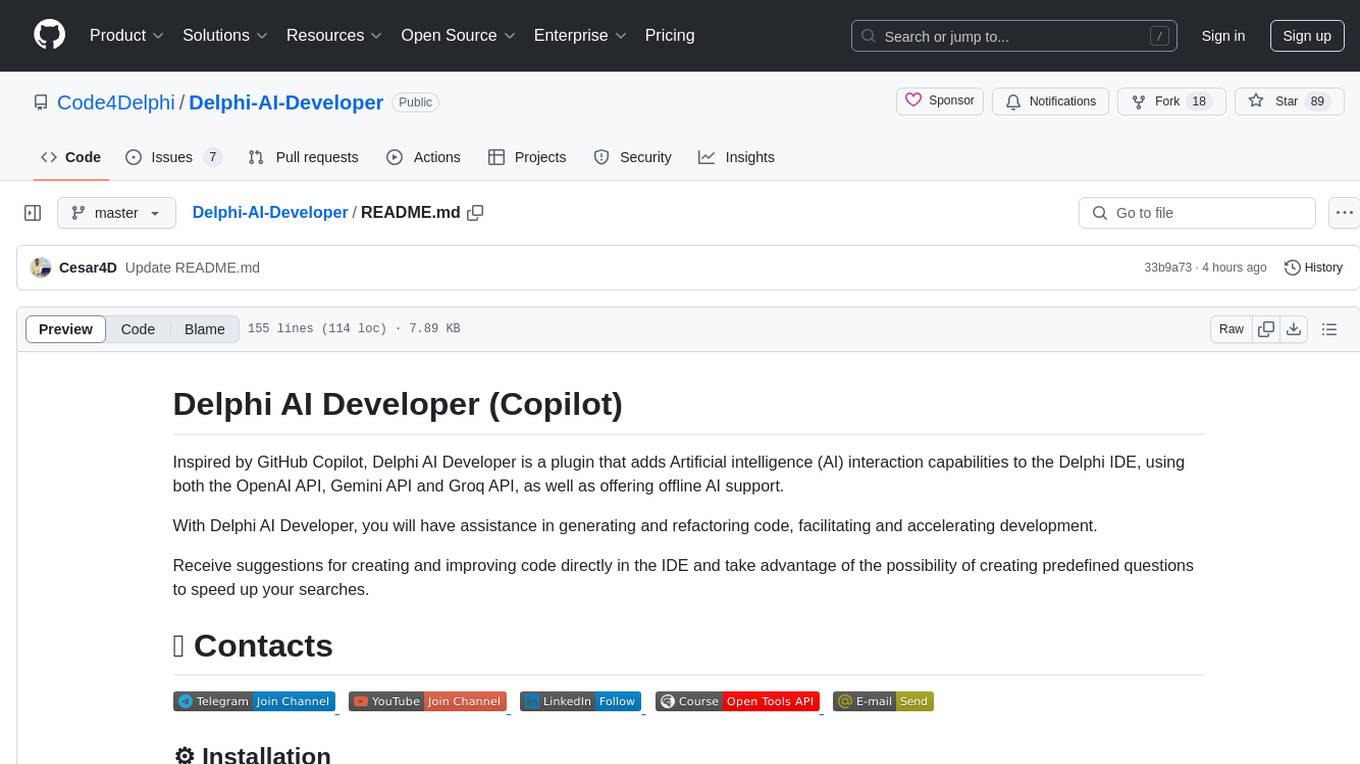
Delphi-AI-Developer
Delphi AI Developer is a plugin that enhances the Delphi IDE with AI capabilities from OpenAI, Gemini, and Groq APIs. It assists in code generation, refactoring, and speeding up development by providing code suggestions and predefined questions. Users can interact with AI chat and databases within the IDE, customize settings, and access documentation. The plugin is open-source and under the MIT License.
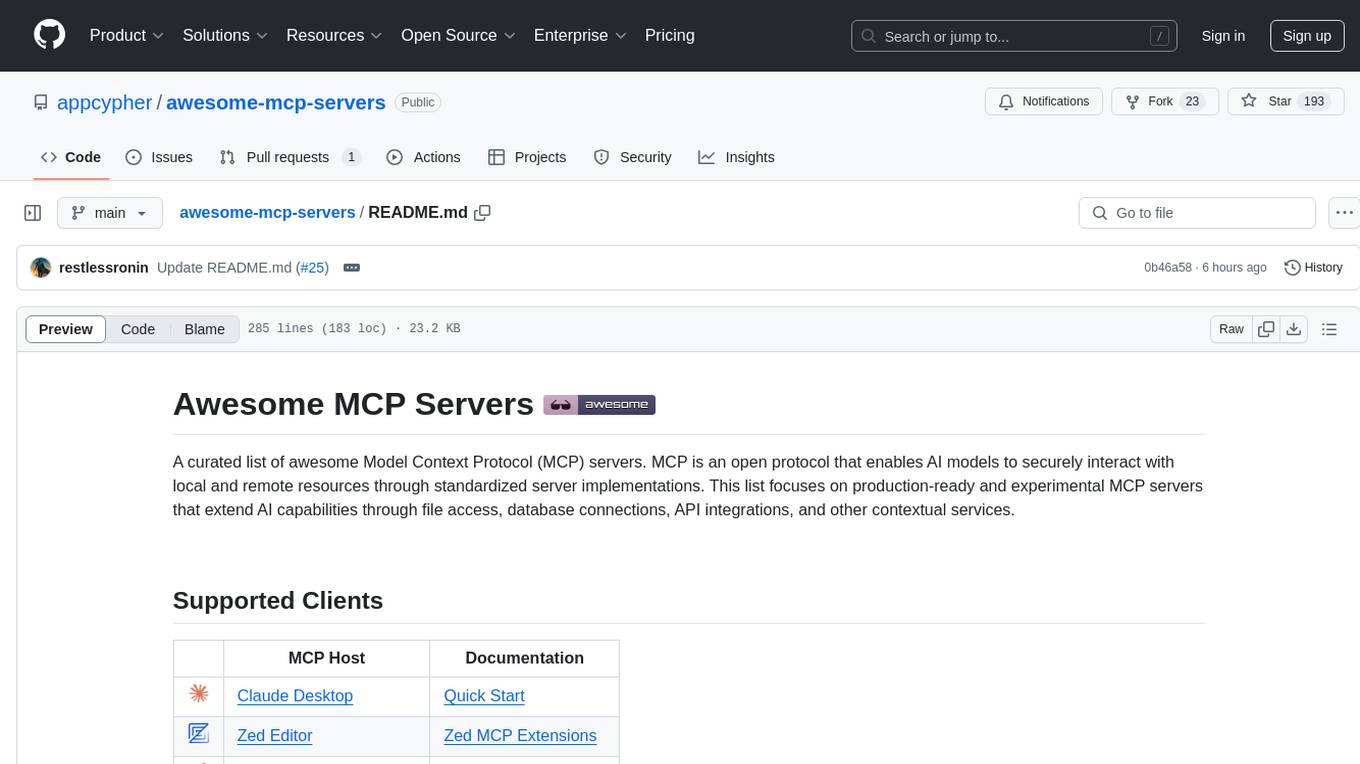
awesome-mcp-servers
A curated list of awesome Model Context Protocol (MCP) servers that enable AI models to securely interact with local and remote resources through standardized server implementations. The list focuses on production-ready and experimental servers extending AI capabilities through file access, database connections, API integrations, and other contextual services.
For similar jobs

lollms-webui
LoLLMs WebUI (Lord of Large Language Multimodal Systems: One tool to rule them all) is a user-friendly interface to access and utilize various LLM (Large Language Models) and other AI models for a wide range of tasks. With over 500 AI expert conditionings across diverse domains and more than 2500 fine tuned models over multiple domains, LoLLMs WebUI provides an immediate resource for any problem, from car repair to coding assistance, legal matters, medical diagnosis, entertainment, and more. The easy-to-use UI with light and dark mode options, integration with GitHub repository, support for different personalities, and features like thumb up/down rating, copy, edit, and remove messages, local database storage, search, export, and delete multiple discussions, make LoLLMs WebUI a powerful and versatile tool.

Azure-Analytics-and-AI-Engagement
The Azure-Analytics-and-AI-Engagement repository provides packaged Industry Scenario DREAM Demos with ARM templates (Containing a demo web application, Power BI reports, Synapse resources, AML Notebooks etc.) that can be deployed in a customer’s subscription using the CAPE tool within a matter of few hours. Partners can also deploy DREAM Demos in their own subscriptions using DPoC.

minio
MinIO is a High Performance Object Storage released under GNU Affero General Public License v3.0. It is API compatible with Amazon S3 cloud storage service. Use MinIO to build high performance infrastructure for machine learning, analytics and application data workloads.

mage-ai
Mage is an open-source data pipeline tool for transforming and integrating data. It offers an easy developer experience, engineering best practices built-in, and data as a first-class citizen. Mage makes it easy to build, preview, and launch data pipelines, and provides observability and scaling capabilities. It supports data integrations, streaming pipelines, and dbt integration.

AiTreasureBox
AiTreasureBox is a versatile AI tool that provides a collection of pre-trained models and algorithms for various machine learning tasks. It simplifies the process of implementing AI solutions by offering ready-to-use components that can be easily integrated into projects. With AiTreasureBox, users can quickly prototype and deploy AI applications without the need for extensive knowledge in machine learning or deep learning. The tool covers a wide range of tasks such as image classification, text generation, sentiment analysis, object detection, and more. It is designed to be user-friendly and accessible to both beginners and experienced developers, making AI development more efficient and accessible to a wider audience.

tidb
TiDB is an open-source distributed SQL database that supports Hybrid Transactional and Analytical Processing (HTAP) workloads. It is MySQL compatible and features horizontal scalability, strong consistency, and high availability.

airbyte
Airbyte is an open-source data integration platform that makes it easy to move data from any source to any destination. With Airbyte, you can build and manage data pipelines without writing any code. Airbyte provides a library of pre-built connectors that make it easy to connect to popular data sources and destinations. You can also create your own connectors using Airbyte's no-code Connector Builder or low-code CDK. Airbyte is used by data engineers and analysts at companies of all sizes to build and manage their data pipelines.

labelbox-python
Labelbox is a data-centric AI platform for enterprises to develop, optimize, and use AI to solve problems and power new products and services. Enterprises use Labelbox to curate data, generate high-quality human feedback data for computer vision and LLMs, evaluate model performance, and automate tasks by combining AI and human-centric workflows. The academic & research community uses Labelbox for cutting-edge AI research.









